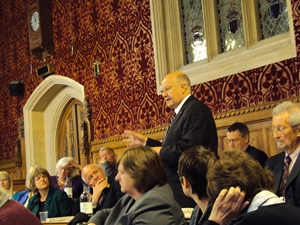Making later life better,
now and in the future.

© Copyright SEEFA 2024
Registered Charity Number 1156957 SOUTH EAST ENGLAND FORUM ON AGEING
This web site may contain links to external web sites. SEEFA does not accept any responsibility or liability
for the content or consequences of visiting external web sites.


Ageism and discrimination
Prevailing social attitudes to ageing represent one of the main obstacles to improving the quality of later life. The ageing population is often portrayed as a burden on society as a result of the perceived cost consequences of increased longevity. The assumption is that more older people means more pressure on health and social care services, pensions and welfare benefits. In short, older people are represented as a drain on the country’s resources.
This one sided view of later life needs to be challenged. Missing from this simplistic equation is the contribution of older people and the extent to which they have earned the right to high quality care and adequate financial support. Over their lifetime the economic contribution made by many older people will outweigh the financial help they receive. The economic benefit from their contribution as carers and volunteers alone would, if calculated, mitigate a significant amount of their so called consumption of society’s resources.
their so called consumption of society’s resources.
In addition, the language used to talk about later life tends to be negative, and older people are often characterised as vulnerable, dependent or even incapable. The challenge to any form of discrimination begins with language and SEEFA will use every opportunity to challenge inappropriate language and at the same time to highlight positive aspects of later life, including the achievements and contribution of older people.
SEEFA is concerned about the negative effects of age discrimination upon services. There is plenty of anecdotal evidence to suggest that older people’s health, wellbeing, employment, income, safety and care all suffer as a result of ageist attitudes and behaviour.
SEEFA Symposium on
Health and Social Care
We’d like to hear your views. If you would like to contribute to the SEEFA Agenda, please contact us.
KEY ISSUES FOR SEEFA
Ageism and Age Discrimination
Employment and Older Workers
Health and Care
Housing and Support
Finances in Later Life
Social Isolation
Older People as Individuals
Engagement
... and coming up:
Older People as Consumers
Being Age Friendly

Employment and the older workforce
 There are still too few employment opportunities for older people; those seeking work are likely to encounter ageism while those already in work may face pressure to give way to younger employees. In the face of high levels of youth unemployment, voices are being raised against the older workforce, which is perceived by some to be taking jobs away from younger people.
There are still too few employment opportunities for older people; those seeking work are likely to encounter ageism while those already in work may face pressure to give way to younger employees. In the face of high levels of youth unemployment, voices are being raised against the older workforce, which is perceived by some to be taking jobs away from younger people.
SEEFA is clear that older people are not the cause of youth unemployment; neither is their removal from the labour market its solution. As longevity increases and the health of older people improves, the longer they are likely to remain in employment. An important consequence of this is that they will contribute to the economy both as tax payers and consumers. Growth in the older workforce will clearly offset some of the projected cost consequences of demographic change.
Research by the National Institute of Economic and Social Research found that a one year average extension of working life:
- increases the country’s real GDP by around one per cent around six years later
- increases the level of employment by around 1.6 per cent (approaching half a million) around four years later.
As the Government said in its impact assessment on the phasing out the Default Retirement Age, “although there is a persistent assumption that older people in work ‘block’ younger people from finding work, evidence suggests this is incorrect. The number of jobs in the economy is not fixed, but depends on Government and private spending (when spending increases the number of jobs increases). Evidence suggests the employment rate of older people has little effect on the employment of younger people, and if anything a higher employment rate of older people tends to slightly increase the employment rate of younger people.”
And, to quote Saga’s Director General, Dr Ros Altmann: “If you have got more people working at any age they will have more money to spend and create jobs for more people… Everybody loses if you force people out of work, when it is a growing proportion of the population. If someone is still working, they are creating wealth somewhere in the economy.”
For employers too there is a solid business case for the older workforce; older people are conscientious, reliable, trustworthy and in a position to act as role models and mentors within an employee team.
SEEFA is supporting and disseminating research studies to promote positive messages about the employment of older people. These include:
- The 40-
70 Tomorrow’s Workforce project which piloted ways of supporting older workers to extend their working lives. - The Valuing Older Workers case studies on how voluntary organisations draw on the skills and experience of older workers.
- The forthcoming Business Age project on the employment of older workers in small and medium enterprises (SMEs).
Health and Care
Ageing itself is not a problem, but for some people later life will be accompanied by failing health and difficulties in managing day to day tasks. The older people are, the more likely this is to be the case. So, while the majority of older people may be healthy and able to manage perfectly well, health and social care services are an important matter for the significant minority of people who do need help. The nature and quality of such provision should be a key concern, therefore, of any organisation seeking to promote the interests of older people. SEEFA will support health and social care policies, nationally and locally, that take account of the following:
- People should be assisted to keep on contributing to their communities and remain independent as long as possible. This should be the starting point for any health and care service
- Older people are individuals: their care should be personalised and should take account of their unique needs and circumstances
- Older people should be treated with dignity and respect, recognising the life they have lived, their past achievements and contribution to society; above all older people need to be cared for with compassion
- Good and accessible information and advice is essential to maintaining health and well-
being
- Older people should be seen as experts, based on their own life experiences, and should be involved with commissioners and providers in ‘co-
designing’ services; more thought needs to be given to what kind of services older people value
- Helping older people to remain independent requires timely intervention; this often means recognising the value of preventative care or low level of support for people before they reach crisis point
- Communities should be supported to develop schemes to combat social isolation among older people.
Housing and support
The importance of meeting the accommodation needs of older people is often overlooked. Good housing is fundamental to good health and well-
Many older people are ‘trapped’ in inappropriate accommodation, whether as owner occupiers in homes they can no longer afford to maintain or as private tenants in properties that lack basic amenities. The creation of more housing options for older people is a priority. For some the availability of suitable alternative housing would mean the possibility of a welcome move; for others help with maintaining their property would avoid a forced move.
As people’s needs increase it may become too difficult or too costly to continue to support them in their existing accommodation. For many this has meant moving into a residential care home where there is a loss of independence; for many older people care homes are seen as the last resort. One of the challenges in meeting the needs of future generations of older people is to find more suitable models of long term care. The emergence of extra care housing as a means of providing the necessary levels of care behind an individual’s own front door appears to provide a way forward. SEEFA is committed to promoting a model of long term care that enables people to receive care when needed while at the same time living in what is effectively their own home. The continued provision of residential care and nursing homes must be accompanied by changes in the underlying model where the choice and control currently exercised by older people in these settings appear limited.
Finance and later life
 Many older people face financial hardship; they are reliant on the state pension and other means tested benefits to survive in a world where the cost of everyday living has risen significantly in recent years. Demographic change and concern over levels of welfare spending mean that there is unlikely to be any step-
Many older people face financial hardship; they are reliant on the state pension and other means tested benefits to survive in a world where the cost of everyday living has risen significantly in recent years. Demographic change and concern over levels of welfare spending mean that there is unlikely to be any step-
SEEFA’s position on non-
Older people also face financial disadvantage as a result of the changing nature of how goods and services are traded and their limited understanding of the different options that may be available. The proliferation of different tariffs across energy suppliers and communication companies, for example, may mean that older people are missing out on the best deals and may be stuck with a costly tariff out of some misplaced sense of loyalty. SEEFA will call for commercial organisations across the Region to adopt a more ‘age friendly’ approach and to be more helpful in dealing with older people who may find the modern world of on-
Social isolation
 Social isolation is a key factor in limiting good health and well-
Social isolation is a key factor in limiting good health and well-
If our houses are not in age friendly communities we face increased social isolation and curtailed independence. We would like greater emphasis to be placed upon developing age friendly communities which enable all people to fully participate. This means having safe and welcoming streets with easy access to local shops, health services and community activities. We value positive interaction across all age groups.
Older people, particularly in rural areas, need flexible transport options. Hospital and GP appointments are a real concern. Existing hospital transport services often involve patients having to wait for long periods either side of their appointment and there is a need for schemes that are more individualised such as the East Sussex Age UK Take Home and Settle Service.
Without available transport people’s ability to remain independent is compromised, not being able to get out to shop, go to the post office or bank. Opportunities for leisure and social contact are also reduced. Where public transport is limited there is a real need to support the provision of community transport schemes.
Treating all people as individuals, including minority groups
SEEFA is concerned about later life for all older people. As well as facing negative attitudes and behaviour based on age, members of minority groups can face additional challenges. Older members of minority ethnic groups are vulnerable to receiving poorer services and SEEFA is concerned about cultural, religious and language needs being met appropriately. All older people must be treated as individuals. We would like to see greater emphasis upon engaging with service users and their families when planning individual health and care services.
SEEFA is aware that the housing and care needs of lesbian, gay, bisexual and transgender (LGBT) older people are not always met appropriately. These minority groups are also particularly vulnerable to social isolation. Specific strategies are needed to address this. We are aware that there are instances of equality and human rights breaches affecting older people and transgender people may be at higher risk.
Engagement
 Engagement means better decision making. Listening properly to people who know what they are talking about is even more important when finances are tight and bad decisions are costly. Engagement needs to take place at various levels including with national and local policy makers but also on an individual basis with service users.
Engagement means better decision making. Listening properly to people who know what they are talking about is even more important when finances are tight and bad decisions are costly. Engagement needs to take place at various levels including with national and local policy makers but also on an individual basis with service users.
Good engagement is more than putting out consultation documents. If there is the desire and the effort is made, the benefits can be enormous. Research (e.g. Engaging with Older People Evidence Review, Age UK) shows that people who are engaged in their community have better health outcomes Some people may feel excluded from contributing because of social isolation or because they have a limiting condition. Nevertheless it is essential measures are put in place so they can have a say. People in care homes, for example, should not be excluded.
SEEFA is calling for a New Narrative on Ageing.
Click here.
Our Agenda
| MESSAGE from the Chair |
| SYMPOSIA |
| POLICY PANELS |
| BRIEFINGS |